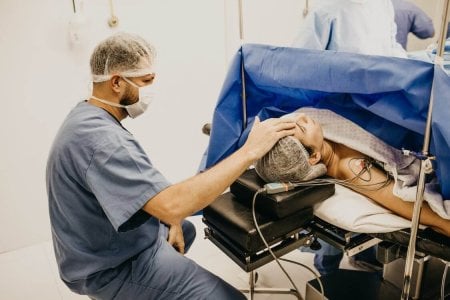Find out if YOUR local hospital made the list of Australia's most underperforming public hospitals
- Replies 36
The Australian Medical Association (AMA) has released a damning new report which reveals which of the nation’s public hospitals are underperforming — and it’s a pretty shocking read.
The medical group found that out of 201 state-funded hospitals included in their analysis, a mere three were found to be delivering care to patients within the recommended time.
The AMA’s new Australian Public Hospitals in Logjam 2023 analysis which covered 2021-2022 'paints a worsening picture of emergency department and essential surgery performance’, according to AMA President Steve Robson.
The result is a stark decrease from the year prior. In 2020-21, 15 of 201 hospitals received 'green lights' against the same standards, demonstrating that a vast amount of public hospitals are failing to deliver standard care to patients in time.
The three hospitals meeting expectations are NSW’s Young Hospital and SA’s South Coast District and Riverland General hospitals.

The AMA found that based on data from the Australian Institute of Health and Welfare, these hospitals were able to deliver on-time care to their patients in terms of emergency department response and elective surgeries.
‘It’s devastating for every person waiting and dealing with months and months of pain,’ Robson said.
‘It’s unlikely hospitals will be able to expand their capacity to address this backlog if there is no intervention.’
The public health system, still reeling from the ravages of a global pandemic, is under mounting pressure from continued workforce shortages, increased ambulance ramping, and emergency departments beyond capacity.
Given the dismal results, the AMA is calling on the government to take steps to address the estimated hundreds of thousands of surgeries said to be in Australia’s backlog.
‘When National Cabinet sits down on (February 3), we want ministers to tackle the backlog of surgeries that we estimate will top half a million at the end of June,’ Robson said.
‘We are calling for a new national plan funded by all governments but with an up-front advance payment provided by the Commonwealth to support state and territory governments to expand their hospital capacity, including the workforce, to address the elective surgery backlog.’

This includes removing the yearly 6.5 per cent ceiling placed on federal funding increases.
The AMA is also calling on the public to take a proactive stance and check how their local hospital fared in their Hospital Logjam Finder tool.
‘The AMA’s logjam finder is the only place national hospital data is presented in this way and we’re asking people to tell us their stories and email their MPs so state and federal governments can hear their voices,’ he said.
Aussies may share their public hospital experiences with the AMA here.

On the note of reforms, there also have been previous calls for change in Medicare citing how its funding model potentially marginalises many Australians from accessing quality health care.
In fact, a report released in December of last year said the government health program was ineffective and ‘in the grip of a mid-life crisis’ and suggested several changes. These include making it easier for GPs to work with other allied health professionals and deploying an additional 1000 clinicians across Australia to augment public health service.
As part of systemic problems plaguing Medicare, it was previously pointed out that more and more GPs are moving away from bulk-billing out of concerns for the sustainability of their practices.

It was also reported in October that billions of dollars were lost to Medicare fraud due to false claims, which led to fears of further understaffing in the medical sector due to doctors’ mass resignations.
Hopefully, changes are made for all Australians to enjoy the quality healthcare they deserve.
How about you, have you had a good or bad experience in your local hospital? Share your story in the comments below!
Source: YouTube/7NEWS Australia
The medical group found that out of 201 state-funded hospitals included in their analysis, a mere three were found to be delivering care to patients within the recommended time.
The AMA’s new Australian Public Hospitals in Logjam 2023 analysis which covered 2021-2022 'paints a worsening picture of emergency department and essential surgery performance’, according to AMA President Steve Robson.
The result is a stark decrease from the year prior. In 2020-21, 15 of 201 hospitals received 'green lights' against the same standards, demonstrating that a vast amount of public hospitals are failing to deliver standard care to patients in time.
The three hospitals meeting expectations are NSW’s Young Hospital and SA’s South Coast District and Riverland General hospitals.

The number of hospitals AMA assessed to be delivering timely medical care dropped from 15 to 3 in a year, according to their latest report. Image Credit: Pexels/Pixabay
The AMA found that based on data from the Australian Institute of Health and Welfare, these hospitals were able to deliver on-time care to their patients in terms of emergency department response and elective surgeries.
‘It’s devastating for every person waiting and dealing with months and months of pain,’ Robson said.
‘It’s unlikely hospitals will be able to expand their capacity to address this backlog if there is no intervention.’
The public health system, still reeling from the ravages of a global pandemic, is under mounting pressure from continued workforce shortages, increased ambulance ramping, and emergency departments beyond capacity.
Given the dismal results, the AMA is calling on the government to take steps to address the estimated hundreds of thousands of surgeries said to be in Australia’s backlog.
‘When National Cabinet sits down on (February 3), we want ministers to tackle the backlog of surgeries that we estimate will top half a million at the end of June,’ Robson said.
‘We are calling for a new national plan funded by all governments but with an up-front advance payment provided by the Commonwealth to support state and territory governments to expand their hospital capacity, including the workforce, to address the elective surgery backlog.’

The AMA wants the government to enact changes that would address the thousands of pending elective surgeries across Australia. Image Credit: Pexels/Jonathan Borba
This includes removing the yearly 6.5 per cent ceiling placed on federal funding increases.
The AMA is also calling on the public to take a proactive stance and check how their local hospital fared in their Hospital Logjam Finder tool.
‘The AMA’s logjam finder is the only place national hospital data is presented in this way and we’re asking people to tell us their stories and email their MPs so state and federal governments can hear their voices,’ he said.
Aussies may share their public hospital experiences with the AMA here.
Key Takeaways
- Only 3 of 201 public hospitals in Australia are delivering care to patients within recommended time frames according to an AMA report.
- Their Australian Public Hospitals in Logjam report paints a severe picture for the country's health system says AMA President Steve Robson.
- The AMA is calling on National Cabinet this week to tackle the country’s backlog of surgeries, with a new national plan funded by all governments.
- The public is also encouraged to use the AMA's Hospital Logjam tool to see how their local hospitals are faring.
In fact, a report released in December of last year said the government health program was ineffective and ‘in the grip of a mid-life crisis’ and suggested several changes. These include making it easier for GPs to work with other allied health professionals and deploying an additional 1000 clinicians across Australia to augment public health service.
As part of systemic problems plaguing Medicare, it was previously pointed out that more and more GPs are moving away from bulk-billing out of concerns for the sustainability of their practices.

There have also been long standing calls for the government to reform Medicare over fears its structure inevitably leads to more Australians losing access to health care. Image Credit: Pexels/Karolina Graboswka
It was also reported in October that billions of dollars were lost to Medicare fraud due to false claims, which led to fears of further understaffing in the medical sector due to doctors’ mass resignations.
Hopefully, changes are made for all Australians to enjoy the quality healthcare they deserve.
How about you, have you had a good or bad experience in your local hospital? Share your story in the comments below!
Source: YouTube/7NEWS Australia







